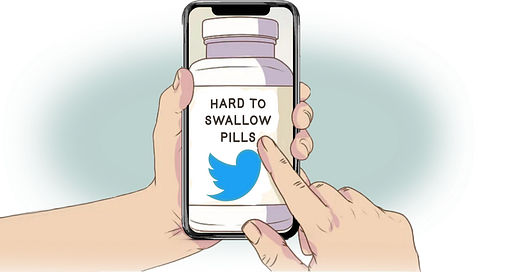“All the hateful arguing of Facebook without any pictures of your nephew’s piano recital” — Stephen Colbert
If you’ve been on the internet at all lately, I’m sure you're aware of what a giant tire fire Twitter has become (personally, I have always felt that Twitter was a toxic pit best avoided completely, but it also has 200 million users so who’s to say really).
If you’re interested in quitting, I’ll have some practical advice coming next week (update: it’s here!), but for now I have some food rapid-dissolve tablets for thought:
Pill #1: There is no breaking news story so important that you need to know it before it can be fact checked and edited by the professionals.
Seriously, do your sense of reality a favor, and only consume news you to know to be real. It’s better for you, it’s better for society. Furthermore, the nature of Twitter (and it’s algorithms) ensure you will only be served up the most sensational, eye-catching news. That’s obviously not including the overtly fake, or stories presented with misleading context.
Pill #2: Twitter provides a convincing illusion that you’re hanging out in the same place as celebrities, politicians and influencers.
But it’s just that, an illusion. Well, technically you are in the same place, and that place is called planet Earth. Twitter has a lot of users. If there was a room big enough to house all 200 million of them, trust me- you would be nowhere near the celebrities. The celebrities who are actually on Twitter (and don’t just have an account managed by a PR person) are mostly just interacting with other celebrities. Being able to read a tweet they typed with their own fingers does not make you any closer to them.
Pill #3: The fact that a lot of journalists and influential people are addicted to Twitter make it feel more important than it is.
Twitter has half the active monthly users that snapchat does. But because it’s become a de-facto (240-character) press-release zone, it gets referenced in the news more than anywhere else. Tweets that stir a lot of Twitter drama but would otherwise not be even worth mentioning become front-page news, because the people reporting the news are addicted to Twitter.
Journalists may say they “need it for their job”, which makes sense, but somehow I don’t think their job involves so much color commentary and hot takes on current events1. Don't believe the hype.
Pill #4: Twitter has a corrupting effect on people who crave attention.
Who craves attention the most? Actors, politicians, influencers, etc. If you actually are one of the influential “elite” on Twitter you need to be especially careful of the platform’s distorting effect on your sense of self. Computer scientist and philosopher Jaron Lanier calls this effect “Twitter poisoning” which he describes thusly:
What do I think are the symptoms of Twitter poisoning? There is a childish insecurity, where before there was pride. Instead of being above it all, like traditional strongmen throughout history, the modern social media-poisoned alpha male whines and frets. This works because his followers are similarly poisoned and can relate so well.
Anyone who’s spent any amount of time on Twitter quickly realizes that many people they thought they respected are actually deeply annoying. It’s entirely possible these people were always the snarky know-it-all kids yelling commentary from the back row of class, but I suspect it’s more likely the platform is poisoning them into believing they are more special than everyone else.
Pill #5: People aren’t taking your tweets to heart.
I actually wrote a whole essay about the fallacy that genuine discussions are capable of happening on Twitter. You can read it here:
There is an argument to be made that social media “debate” isn’t actually about convincing the person you’re debating of anything, it’s a performance meant to convince the lurkers reading it. Which is something to consider, but I’m also pretty sure nobody on Twitter is taking anything to heart that they don’t already agree with.
I always try to find the positives in social media sites because I believe it’s important to re-examine one’s own convictions, and although I believe the current incarnations to be net-negative overall, there are positive aspects to them. Instagram has some great photography. TikTok is often a fascinating and judgement-free window into different cultures. It’s the positive parts that make social media so hard to quit.
…But Twitter?
Now I am a relative Twitter outsider, so I could be wrong about this; but from the perspective of this outsider, Twitter appears to have the worst content-to-toxicity ratio of all the platforms. And as Ryan Broderick recently put it: “Twitter has never been able to deal with the fact its users both hate using it and also hate each other.”
I suppose that’s a bonus hard-to-swallow pill. You don’t even like it.
PS - Apologies for the late publishing for this one. I always aim to give y’all something contemplative for lazy Saturday mornings but life gets in the way. If you become a premium subscriber I’ll stick to my deadlines better I swear. Stay Grounded out there✌️
“Current events” among the non twitter-is-a-town-square crowd basically just means “Twitter Drama”.











